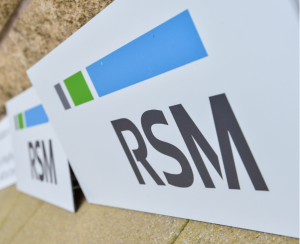RSM’s Weekly Tax Brief – 19 January 2016…
 In this edition of RSM’s weekly round-up of the most important tax news, we cover the latest developments…
In this edition of RSM’s weekly round-up of the most important tax news, we cover the latest developments…
- Is HMRC trying to circumvent legal time limits for tax enquiries?
Mike Down
A fundamental principle of the tax system is that taxpayers are entitled to certainty over finality in their annual tax affairs. Legally, HMRC has a strict time limit, known as the ‘enquiry window’ to raise questions about a submitted tax return. That time limit is 12 months from the date the return is received by HMRC. However, we are now seeing examples of HMRC indulging in what appears to be a backdoor attempt to extend the legal time limit beyond that set out by Parliament – a very concerning development which could leave taxpayers at the mercy of HMRC without adequate safeguards.
- Answers on a postcard please
Andrew Hubbard
The proposal by Republican presidential candidate Ted Cruz to abolish the IRS and replace the citizen’s tax return with a single postcard has resonances with current thinking about tax compliance in the UK. Some further clarity on the government’s digital strategy is urgently needed, but will this be in time for next week’s Parliamentary debate?
- Report on HMRC’s charter finds room for improvement
Andrew Hubbard
The latest annual report on HMRC’s charter shows that the Revenue still has a long way to go to deliver on its customer service commitments – especially when it comes to treating taxpayers as honest. Further work is needed to build public confidence in the tax authority, particularly at a time when HMRC is embarking on a profound transformation exercise.
- Herbal tea case brews up trouble for HMRC
David Wilson
A recent tribunal case involving a VAT refund on herbal tea highlights why it should never be assumed that HMRC is always right.
_______________________________________________________________________
- Is HMRC trying to circumvent legal time limits for tax enquiries?
It’s hard to believe that Income Tax Self-Assessment has now been with us for just short of two decades. Upon its introduction in 1996/97, it was recognised that a fundamental principle of the tax system going forward was that taxpayers must be given an entitlement to certainty over finality in their annual tax affairs. Without this ‘protection’, HMRC could simply pick and choose when to challenge a person’s tax position, potentially long after the event.
This certainty was achieved by Parliament giving HMRC a strict time limit, known as the ‘enquiry window’ to raise questions about a submitted tax return. That time limit is 12 months from the date the return is received by HMRC.
Up until now, the time limit has been fairly and sensibly applied. Worryingly, however, we are now seeing examples of HMRC indulging in what appears to be a backdoor attempt to extend the legal time limit beyond that set out by Parliament in the Taxes Acts.
A series of letters seen by us formally commence the enquiry procedure within the statutory 12 month window, but then go on to suggest (presumably because the Inspector has run out of time to write a detailed letter) that HMRC will delay asking any questions or seeking information or documents for a period of up to three months.
In all the cases we have seen, the 12-month time limit for HMRC to ask questions on the return was about to come to an end. Accordingly, an assumption might perhaps be made that Inspectors are simply trying to protect HMRC’s future position ‘just in case’ rather than decide if there are in fact any questions for the taxpayer to answer.
If this particular thought process is taken to the extreme, we could have the ridiculous position of HMRC opening an enquiry into every tax return that is filed, thus giving themselves infinite time to ask for information if they eventually decide they want to check the accuracy of a return’s contents.
This is a concerning development and is contrary to HMRC’s own internal instructions. HMRC would no doubt contend that a safeguard for any taxpayer put in such a position is that he or she can approach the Tribunal and ask them to direct that the department closes the enquiry. This is true in theory, but with the future risk of taxpayers having to pay a fee to the Tribunal for the privilege of pursuing a tax appeal, many will understandably think twice, leaving them at the mercy of HMRC moving the legal goalposts to suit their own timescales.
- Answers on a postcard please
I’m intrigued by the proposal of Republican presidential candidate Ted Cruz that the IRS can be abolished and a citizen’s tax return replaced by a single postcard size piece of paper or an IPhone App. He even puts up a mock-up on his website of what the postcard might look like. He gets the information request down to 14 questions.
This obviously has resonances with current thinking about tax compliance in the UK. While I don’t think that abolition of HMRC is on anybody’s agenda, questions about how easy it will be for a citizen to comply with his or her tax obligations is a live issue.
The digital strategy proposal has been put forward as a means of reducing the amount of work a taxpayer will have to do, because much of the work will be done digitally using information already held by HMRC. Yet at the same time, there is a proposal for business to provide information quarterly to HMRC. Can the circle be squared?
If HMRC does succeed in devising a system under which quarterly reporting required nothing more than the pressing of a button to send information from the taxpayer’s business records directly to his/her personal tax account then there will be real efficiency. If however quarterly reporting turns into something which is more like completing a quarterly tax return then it seems inevitable that the burden on business will go up.
Currently we don’t really know exactly what will be required. At the moment I am prepared to accept HMRC’s assurances on the matter, but we really do need to start to get into the detail of this very soon.
A debate is being held in Parliament on the issue next Monday, triggered by the very rare achievement of a member of the public getting 100,000 signatures on an online petition, and I hope that this sheds some light on precisely what is proposed.
I’d love to think that in the coming years it really would be possible for taxpayers to send HMRC a postcard – electronic or otherwise – with all of their tax information. I suspect that some taxpayers could be very creative in the choice of picture on the other side of the card.
- Report on HMRC’s charter finds room for improvement
The tax legislation imposes many obligations on taxpayers. It gives HMRC the legal right to collect tax and to administer the tax system but it doesn’t impose any ‘customer care’ obligations on HMRC.
That gap was filled many years ago when the Inland Revenue published the taxpayer’s charter, which for the first time set out some basic obligations on how taxpayers should be treated. Although the charter was never formally withdrawn it fell into abeyance until it was revised in 2008. That version was called ‘your charter’, and set out not only what taxpayers could expect from HMRC but also what HMRC had a right to expect from taxpayers: among the latter were being honest and treating HMRC staff with respect.
There has been a fair amount of cynicism about the charter, particularly the commitment of HMRC to ‘treat you as honest’. All too often people say that when HMRC launch an enquiry it feels as if they are being treated as guilty and required to prove their innocence. That sentiment is reflected in the latest survey figures, which show that only 61 per cent of individuals felt that HMRC treated them as honest. There is a long way to go.
I welcome the fact that HMRC has taken steps to give more prominence to the charter within the department, and has created a charter committee, with a majority of independent members, to report directly to the Board of HMRC. Public confidence in the tax authority is a fundamental bedrock of a democratic society – never more so than when HMRC is embarking on a profound transformation exercise.
HMRC have not helped themselves by amending the wording of the charter to coincide with the issue of the latest report of the charter committee. Although it does appear that no fundamental changes have been made it would surely have been better, in the interests of transparency, to set out clearly what had changed. To find out what had changed it was necessary to dig deep into the internet archives to compare versions. In an increasingly digital world it will be very important to be able to access earlier versions of documents. In a tax dispute, for example, it is often necessary to be able to refer to the HMRC guidance which was in force at the time of the transaction: all too often this seems to have disappeared into thin air.
Although I am an enthusiast for digitalisation part of me feels nostalgic for the old days, when there was a beautifully hand lettered version on a wooden panel on display in the Inland Revenue’s head office – at least that couldn’t be amended at will.
- Herbal tea case brews up trouble for HMRC
While you might expect those in authority such as your doctor or your lawyer to ‘get things right’, the same cannot always be said of HMRC.
Although HMRC does not ordinarily have a duty to advise taxpayers of their liability to VAT, if a taxpayer specifically asks for advice, HMRC is under a duty to give it and, if the advice given is wrong, HMRC may be liable to pay statutory interest as a result of this ‘official error’.
A case in point is where the tax tribunal recently determined that a business in receipt of a VAT refund of over £300k for VAT overpaid on herbal teas should have received a substantial payment of interest from HMRC, rather than the £45.72 actually paid.
Having determined that the taxpayer had specifically asked about the VAT liability of herbal teas and that HMRC were guilty of an ‘official error’ in incorrectly stating that the herbal teas were subject to VAT, the tax tribunal determined that HMRC was liable to pay statutory interest on the value of the VAT overpaid.
Although the facts of this herbal tea case are specific to the parties involved, it does highlight that it should never be assumed that HMRC is always right when it sends you a demand, assessment or tax liability ruling. Indeed, taxpayers should always seek call reference numbers, take contemporaneous notes and request written confirmation in response to enquiries made to HMRC because, if HMRC does get it wrong, the written evidence may support a claim for statutory interest on any VAT incorrectly overpaid.
Go to the main page
Tags: The BIP, Business Information Portal, David Wilson, HMRC, Mike Down, graduate recruitment, birmingham business news, Birmingham News, West Midlands Business News, West Midlands News, Birmingham Events, Business How to guides, Weekly Tax Brief, National, Andrew Hubbard, RSM UK


































